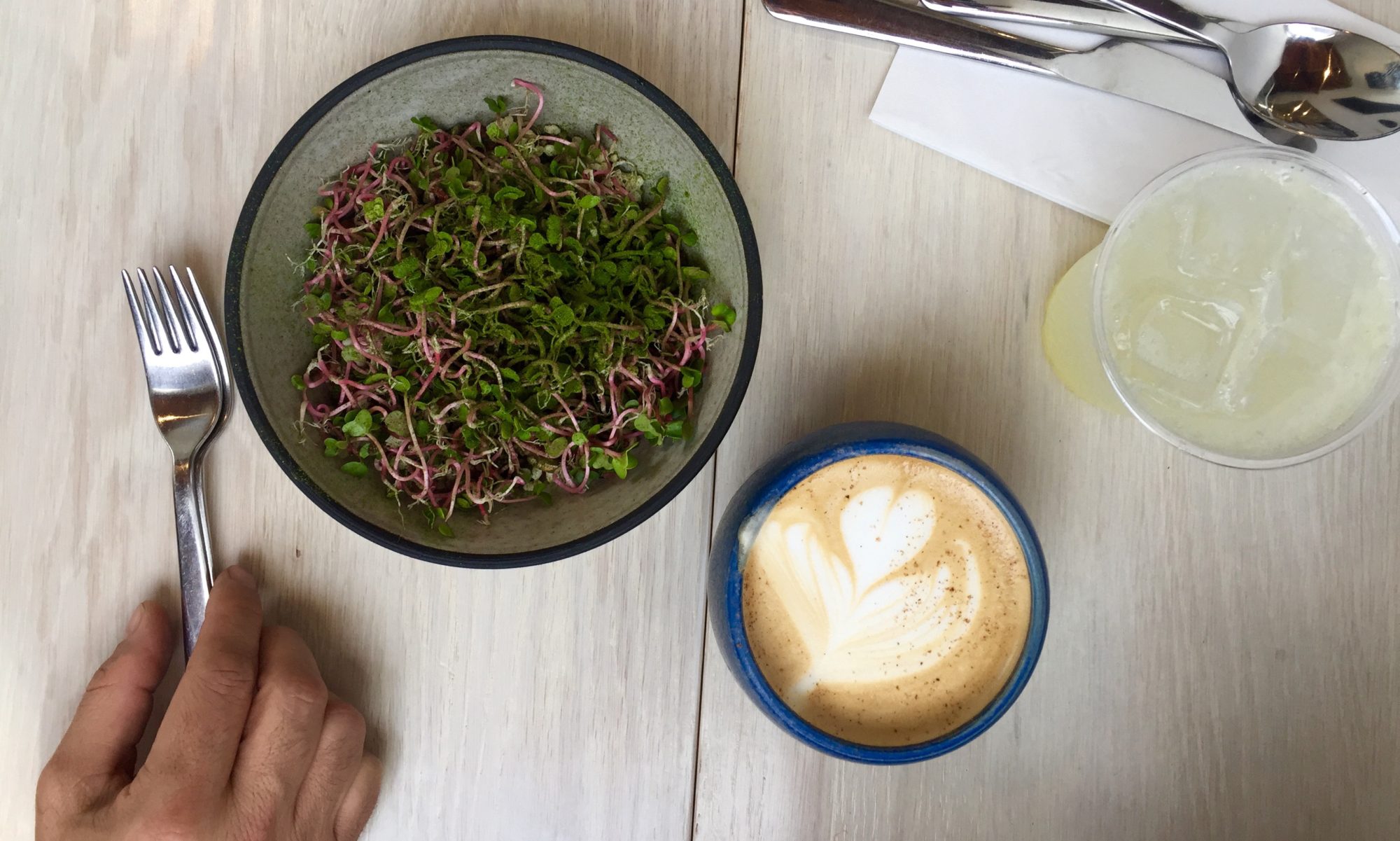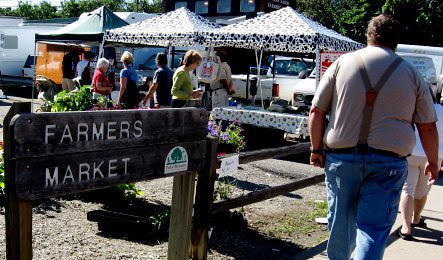When money is this tight, is it possible to shop at a farmers’ market and still save money? The answer is yes: if you’re careful.
If you want to stay committed to your food-shopping budget, you have to be focused at the farmers’ market. As the seasons change and food cravings kick in, a bevy of culinary darlings threaten to coax every last dollar from your wallet and secreted away emergency funds. It’s easy to be blinded by the glory, when there are sun kissed Meyer lemons at 50-cents a piece, a bundle of herbs for just a dollar, beautiful apples for $3.50/lb, and buffalo mozzarella for $16/lb. The farmers’ market offers great bargains alongside cash absorbing luxury items.
DON’T BRING MORE THAN YOU CAN SPEND
Even though this may seem obvious, if you want to stay within your budget it is important not to bring a wallet full of cash to the farmers’ market. Don’t tempt yourself with an “emergency twenty” hidden away in the back of your wallet. If you’re a consummate food lover, all it takes is a glistening berry, a remarkable piece of fish, a gorgeous slab of beef, or a sample of nutty cheese to throw your budget out the window and motivate you to empty your wallet in a second. Do yourself and your budget a favor and leave the extra bucks at home.
ASK BEFORE YOU BUY
Though I may be careful when shopping at the supermarket, there’s something hypnotic about the farmers’ market. I lose all reason. Unlike a grocery store chain that entices me with price tags, the farmers’ lure me with glorious nature at the peak of freshness. The product is beguiling.
When I first started shopping at the farmers market I approached purchasing fruits and vegetables like a jazz player: I let impulse guide me. Though this was a great way to “get my chops” at the market, my impulsive shopping habits took quite a bite out of my weekly budget.
I’m not alone. For many food lovers, food pricing at the farmers’ market is an after thought. For every inexpensive sweet potato there is a tempting (and pricey) Honshimeji Mushroom. Though it may seem obvious, in order to stay true to a budget, you have to ask for pricing before even considering a product. Though asking for prices seriously “harshes” my improvisational style, the staccato sound of fifteen dollars a pound is enough to turn my inspiration elsewhere. And for someone like me that’s easily swayed by guilt, I now ask for pricing on items before I even touch the product I’m considering. Otherwise, that handful of delicious looking berries I spent ten minutes picking through will end up in my shopping bag–despite their astronomical price.
IMPROVISATION VS PLANNING
In the style of Miles Davis, I let the market inspire my culinary riffs. The early days of my improvisational style, unfortunately, were costly. After several weeks with a crisper filled with wilted carrots, moldy mushrooms and soggy broccoli for dishes that never got made, I realized it was time to become a more proficient and focused improviser.
Have a clear theme in mind
Before leaving for the market, I plan the number of meals I want to make. Sunday night and Monday night are my evenings to make dinner. With the number of dishes I want to make in mind, I walk around the market with my hands cemented behind my back: a move that keeps me from reaching into my pockets for my market dollars. I let my creative mind wander and allow the fruit, vegetable, and meat vendors to entice me with their products. Then I formulate the menu I want to create BEFORE buying anything. Then, with a clear menu in mind, I return to the vendors that inspired me.
FOLLOW A RECIPE
Sometimes, even a well-laid out shopping list can’t help. You may have a specific recipe you want to follow, but sometimes a new arrival at the market can distract you and inspire a whole new addition to the menu. Be aware of these impulses. Maybe one additional side dish isn’t a bad thing–but be careful not to lose the plot. Sudden inspirations, however, have turned simple chicken dinners into an elaborate, multi-course tasting menus because I couldn’t help myself. Sure, we enjoyed all the intricate side dishes and courses of food, but in the end my budget was busted.
Now, before I leave for the market, I peruse my favorite cookbooks and come up with specific meals I want to prepare. Using my shopping list as a guide, I stay focused on the list and don’t allow myself to be tempted by every fruit and vegetable that just came into season. If it’s fresh today, it will most likely be available next week. When I find myself being tempted at stand after stand, I start a mental list of what looks good so I can start planning for next week’s menu.
MULTIPLE MEAL PLANNING
If you’re shopping for more than one meal, think about how to maximize your shopping. By thinking big, you can double up on your meal plans to create multiple meals. Buy a whole chicken, roast it for dinner, and use the left-over meat for chicken salad the next day. By maximizing left-over possibilities, you’ll reduce cooking time and create a secondary meal for the next day.
BUY HEARTY
When in doubt, buy items that will last longer than a few days. Produce like potatoes, apples, oranges, and squash have a substantial storage life and can be bought in bulk. Having these low-price and hearty items on hand for a last minute snack not only saves time, the thinking ahead can also save you a fair bit of money.
What are your tricks to saving money at the farmers’ market?




The best way I’ve found to save money at the farmer’s market, especially during high season, is to buy the seconds, like fruit or tomatoes you have to eat right away. Then I immediately freeze the fruit for smoothies or make salsa or sauce for the week. One of the great things about farmer’s markets is they can sell you slightly ugly stuff that you know is good.
A great post. I am so guilty of having the “backup 20” in my back pocket. To make things even worse, my favorite meat/cheese places take credit cards too. Bastards the lot of em.
I actually sit down on a Friday night and plan meals for the week. I started off hating to do this, thinking it was going to ruin creativity – but it has actually done the opposite. With a little more time to plan, I end up cooking far more varied stuff, and find that I spend a lot less at the market.
I keep the dishes pretty open though, since you never quite know what you are going to find when you get to your farmers market. Substitutions are key.
It’s all about the menu…I’ve taken to spending hours with my cookbooks and magazines before a trip to the market, but I always leave room for serendipity. There’s nothing worse than coming home from the farmers’ market with bags of stuff and not enough of anything to finish a recipe or to realize you still need half a dozen things to make those sunchokes work. Having a friend at the market keeps you in check, too 🙂
I completely agree about limiting the amount of cash to take to the farmers market.
Great advice and wisdom here Brooke. We’ll try our best to scale down, but when it comes to the farmers market, we’re like kids in a candy store.
Our method of saving money at the FM is to just not go at all…period! We now only go when we need to buy something and not to just go and just browse on a daily basis.
such great words of advice!
Carrie: I love your seconds idea. I really need to start pickling for this reason.
Matt and Leah:I agree, planning is the best way to keep a farmers’ market junkie in check.
Todd and Diane: wow, I’ve never even thought to just go cold turkey! I’m not sure I’m strong enough to refrain from shopping!